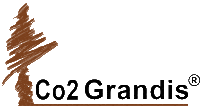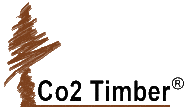Tel 01460 281225
Co2 Grandis® – General guidance and best practices.
This guide applies to any external timber whether it be cladding, decking or fencing.
Please be aware this guidance is offered as general advice and it is not intended as a comprehensive guide. Please check with your professional installer for fixing details and any other relevant requirements for your installation.
Timber is hygroscopic meaning it will expand and contract as it absorbs or loses moisture in line with seasonal/regional conditions.
It is important that the moisture content of the timber has reached equilibrium before installation, this will ensure any contraction/expansion after installation is minimised.
All types of timber cladding, fencing & decking will need a time on site for acclimatisation before installation. Store the timber (unwrapped) in a dry, cool place with good ventilation to all faces of the timber. We generally recommend 2/3 weeks dependant on time of year and location, a good quality moisture meter is always recommended.
Make sure all end grain is sealed with a suitable end grain sealer (see our accessories page). The end grain absorbs vastly more moisture than any other surface and therefore must be protected. It is advisable to apply a good quality oil/paint timber treatment suitable for the type of timber being used to all surfaces coloured or clear, this will help to minimise any water ingress and excessive contraction/expansion after installation (See our accessories page).
When fixing leave expansion gaps to allow for movement.
Install boards individually and make sure any detailing/flashings promotes water away from your project.
Your product should be installed at a minimum of 175mm above ground level, so grass/weeds and the like has no contact with your installed product.
Additional Timbers We Supply & Canadian V British Cedar
Canadian Western Red Cedar – British Western Red Cedar
Although the same species (Thuja Plicata) the growing environment in Canada differs vastly from here in the UK and subsequently each country produces a vastly different product.To simplify the differences -
British Western Red cedar is a consistent honey brown colour and is relatively knotty, perfect for a more rustic "Country" look but Canadian Cedar has a wide range of colours from cream through to red and oak, often on the same length of timber, it has very few knots and lends itself to a more contemporary "Modern" look. Both are suitable for internal or external use.
Canadian and British Cedar can be left untreated and both will "silver/grey" unless a UV oil is applied, please see www.co2cedar.co.uk for Canadian Cedar and for British Cedar please see www.co2timber.co.uk.
Both these timbers are "good to work" i.e., they both machine well and are nice to work with. It is really about the look you want to achieve which normally dictates which type of cedar to use. Both of the Cedars are FSC, PEFC certified (Canadian).
Additional Timbers We Supply
Siberian Larch – Please see www.co2larch.co.uk for details
Although classified as a soft wood Siberian Larch is one of the hardest soft woods around, it is a hard-wearing tough timber which can be left untreated to naturally age (grey/Silver).It lends itself well to both internal and external projects such as Flooring, Decking, Cladding and Fencing.
As with all timber we supply Siberian larch is a sustainable timber, FSC, and if maintained well will easily out last the time it takes to grow. The Siberian climate produces this hard durable timber.
Red Grandis Hardwood – Please see www.grandis.co.uk for details
Eucalyptus Grandis is a part of the Eucalyptus family and commonly known as Rose Gum or Flooded Gum as well as Red Grandis here in the UK. FSC, PEFC and EUTR certified and compliantRed Grandis is a versatile, fast-growing hardwood. Its colour has variations ranging from pale pink to deep red. A good choice for a clean contemporary "Modern" look.
It lends itself well to both internal and external projects such as Flooring, Decking, Cladding and Fencing.
Red Grandis is plantation-grown in areas of Uruguay.
Make sure all end grain is sealed with a suitable end grain sealer (see our accessories page). The end grain absorbs vastly more moisture than any other surface and therefore must be protected. It is advisable to apply a good quality oil/paint timber treatment suitable for the type of timber being used to all surfaces coloured or clear, this will help to minimise any water ingress and excessive contraction/expansion after installation (See our accessories page).
This is a great timber not only for external cladding and landscaping project such as decking but is easily hard enough for flooring.
Balau – Please see www.co2balau.co.uk for details
Grown in Malaysia Balau has a natural resistance to insects and fungus and is ideal for exterior and interior projects.Balau is a very hard timber with smooth fine grain and has very few knots. Mainly associated with decking but is also a very worthy timber cladding, fencing & flooring.
FSC, SVLK (Indonesia’s Timber Legality Assurance), FLEGT (a Organisation to combat illegal logging) compliant.
American and British Douglas Fir – Please see www.co2douglasfir.co.uk for details
American Douglas Fir softwood is a light brown to a reddish brown colour with few knots and is harder and more durable than its European Douglas Fir cousin. Our American Douglas Fir is PEFC compliant, our British is FSC certified.Both can be left untreated and like all timber will “silver/grey” unless a UV oil is applied.
They lends themselves to both internal and external projects such as Flooring, Decking, Cladding and Fencing.
ThermoTimber – Please see www.co2thermotimber.co.uk for details
Co2 thermotimber is a thermally modified timber,the modification process improves the properties of the timber making it a environmentally friendly durable timber.Suitable for external and internal cladding projects.


